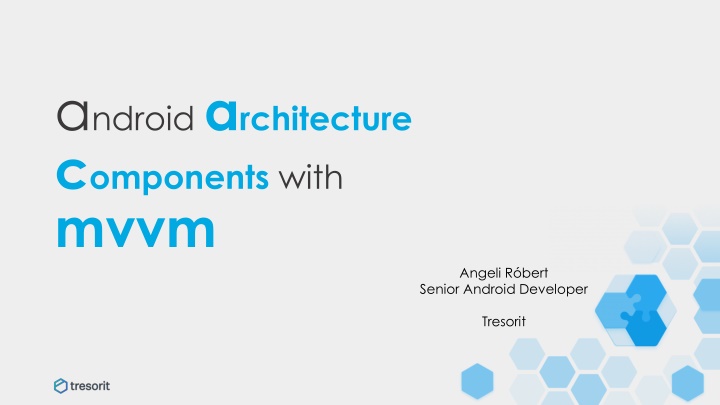
Evolution of Android Architecture Components with MVVM Patterns
"Explore the evolution of Android architecture components with MVVM patterns from classic implementations to modern data binding libraries. Understand the transition from traditional methodologies to current best practices for building robust, testable, and maintainable applications by Google's new architecture components library."
Download Presentation

Please find below an Image/Link to download the presentation.
The content on the website is provided AS IS for your information and personal use only. It may not be sold, licensed, or shared on other websites without obtaining consent from the author. If you encounter any issues during the download, it is possible that the publisher has removed the file from their server.
You are allowed to download the files provided on this website for personal or commercial use, subject to the condition that they are used lawfully. All files are the property of their respective owners.
The content on the website is provided AS IS for your information and personal use only. It may not be sold, licensed, or shared on other websites without obtaining consent from the author.
E N D
Presentation Transcript
android architecture components with mvvm Angeli R bert Senior Android Developer Tresorit
evolution of patterns 2010 classic android mCounterText = (TextView) findViewById(R.id.tv_clicks); mCounterIncrementButton = (Button) findViewById(R.id.btn_increment); mCounterIncrementButton.setOnClickListener(new View.OnClickListener() { public void onClick(View v) { mClicks++; mCounterText.setText(""+mClicks); } });
evolution of patterns 2013 butterknife and retrolambda @Bind(R.id.tv_clicks) mCounterText; @OnClick(R.id.btn_increment) public void onSubmitClicked(View v) { mClicks++; mCounterText.setText(""+mClicks); }
evolution of patterns 2014 avoid fragments flow and mortar mvp react
evolution of patterns 2015 data binding library - mvvm <layout xmlns:android="http://schemas.android.com/apk/res/android"> <data> <variable name="counter" type="com.example.Counter"/> <variable name="handler" type="com.example.ClickHandler"/> </data> <LinearLayout android:orientation="vertical" android:layout_width="match_parent" android:layout_height="match_parent"> <TextView android:layout_width="wrap_content" android:layout_height="wrap_content" android:text="@{counter.value}"/> <Button android:layout_width="wrap_content" android:layout_height="wrap_content" android:onClick="@{handler.clickHandle}"/> </LinearLayout> </layout>
mvvmvsmvp View View user actions update data UI binding View Model Presenter Model Model
databinding pro door to mvvm less boilerplate code binding class generation at compile time contra hard to debug different layout, different screen size
architecture components new library by Google help us design applications that are robust, testable, and maintainable viewmodel livedata room
lifecycle lifecycle abstract class can be observed events from lifecycle change lifecycleowner interface implemented by lifecycle aware components
viewmodel store and manage UI-related data lifecycle conscious survive configuration changes restore data asynchronous call delegation
viewmodel restore data old way: onsaveinstancestate() fragment instance retaininstancestate() handling configuration changes by yourself new way: viewmodelprovider store for viewmodels
viewmodel provider val profileViewModel = ViewModelProviders.of(this).get(SomeViewModel::class.java)
viewmodel class SignUpViewModel @Inject constructor() : ViewModelBase() { val email = ObservableField("") val firstName = ObservableField("") val lastName = ObservableField("") ... override fun onCreateView(inflater: LayoutInflater, container: ViewGroup?, savedInstanceState: Bundle?): View { return super.onCreateView(inflater, container, savedInstanceState).also { binding?.viewmodel = obtainViewModel<SignUpViewModel>().apply { ... lifecycle.addObserver(this) } } }
viewmodel must never reference a view, lifecycle, or any class that may hold a reference to the activity context modularity leak safety testability
viewmodel problem: viewmodel without any android dependency (resources) androidviewmodel allows applicaion context solution: binding adapter
viewmodel binding adapter @BindingAdapter("text") @JvmStatic fun set(view: TextView, resId: Int) = if (resId == 0) view.text = "" else view.setText(resId) @BindingAdapter("src") @JvmStatic fun set(view: ImageView, resId: Int) = view.setImageResource(resId) @BindingAdapter("textColor") @JvmStatic fun set(view: TextView, resId: Int) = view.setTextColor(view.resources.getColor(if (resId == 0) R.color.transparent else resId))
viewmodel problem: communication between fragments solution: common viewmodel master-detail fragment activity does not know anything about this communication fragments do not need to know about each other
livedata observable data holder lifecycle-aware no memory leaks no crashes due to stopped activities no more manual lifecycle handling always up to date data
livedata class SignUpViewModel @Inject constructor() : ViewModelBase() { ... val showProgress = LiveData<Boolean>() override fun onCreateView(inflater: LayoutInflater, container: ViewGroup?, savedInstanceState: Bundle?): View { return super.onCreateView(inflater, container, savedInstanceState).also { binding?.viewmodel = obtainViewModel<SignUpViewModel>().apply { showProgress.observe(this@SignUpFragment, Observer { showProgress(it) }) ... } } }
livedata problem: leak viewmodel model (e. g. repository) is holding a reference to a callback in the viewmodel, the viewmodel will be temporarily leaked
livedata leak viewmodel Live Data Local Data Source observes View Model Model View user actions Local Data Source
livedata leak viewmodel Live Data Local Data Source View Model Model View Local Data Source
livedata leak viewmodel solution: drop callback on onclear in model use weakreference or eventbus use livedata between viewmodel and model
livedata leak viewmodel Live Data Local Data Source observes observes View Model Model View user actions data Local Data Source
livedata leak viewmodel Live Data Local Data Source View Model Model View Local Data Source
livedata problem: livedata between viewmodel and model subscribe from the viewmodel if you do not have access to the lifecycleowner solution: using transformation
livedata transformation map() make changes to the LiveData value before dispatching it switchMap() return a different LiveData instance based on the value of another one.
livedata problem: handle context-dependent operations from viewmodel solution: event from viewmodel to view (singleliveevent) show dialog start activity show fragment show snackbar show toast ...
livedata singleliveevent no event-triggering during configuration change events only after subscription contra: only one observer can be notified
livedata singleliveevent class SingleLiveEvent<T> : MutableLiveData<T>() { private val pending = AtomicBoolean(false) @MainThread override fun observe(owner: LifecycleOwner, observer: Observer<T>) { super.observe(owner, Observer<T> { t -> if (pending.compareAndSet(true, false)) { observer.onChanged(t) } }) } @MainThread override fun setValue(t: T?) { pending.set(true) super.setValue(t) } }
livedata singleliveevent viewmodel val snackbarText = SingleLiveEvent<Int>() view snackbarText.observe(activity, { showMessage(it) })
thank you! Angeli R bert Senior Android Developer Tresorit
